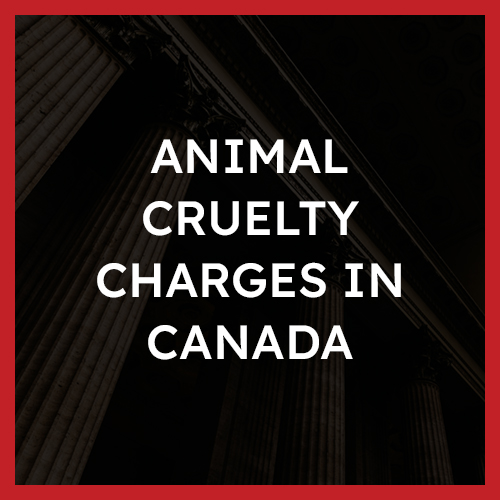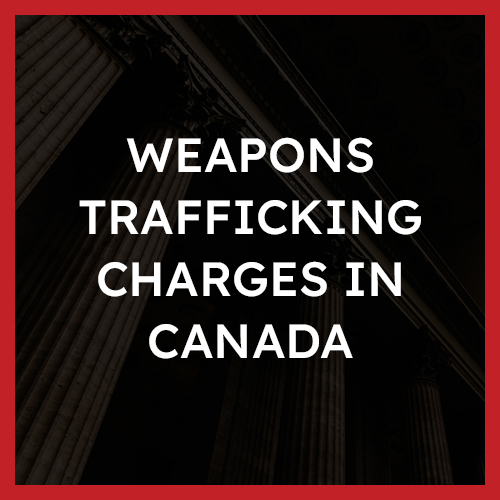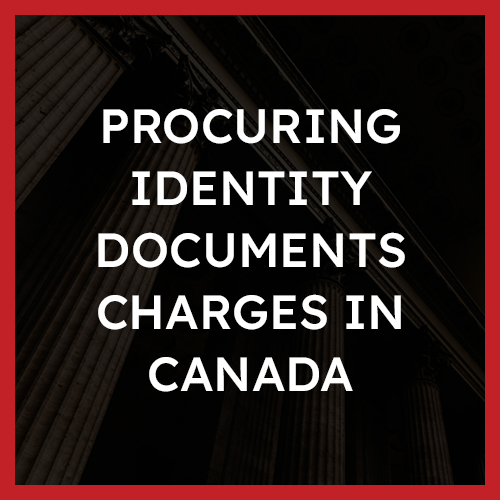Animal Cruelty (s. 445 – 447) Charges in Canada: Offences, Defences, Punishments
What is animal cruelty?
 Animal cruelty laws are covered under s.445 to s.447 of the Criminal Code.
Animal cruelty laws are covered under s.445 to s.447 of the Criminal Code.
Under these sections of the Criminal Code it is an offence to willfully cause animals to suffer from neglect, pain or injury.
There has been much criticism directed towards animal cruelty laws in Canada by academics and legal scholars alike. This is due to the wording of the provision and the high standard of “wilful causation” that must be met by the Crown Prosecutor in order to secure a conviction for animal cruelty.
Animal cruelty charges covered under s.445 to s.447 of the Criminal Code are hybrid offences. This means depending on the circumstances of your cases, and whether there are any aggravating or mitigating factors present, the Crown can elect to proceed either by indictment or summarily.
Examples
Some common examples of animal cruelty may include the following:
- Electrocuting an animal;
- Euthanizing animals in a way that is not tolerable for them;
- Facilitating cockfighting;
- Physically abusing your dog or domestic animal; or
- Not meeting farming industry standards.
Defences
A strong defence to a criminal charge, such as an animal cruelty charges, will heavily depend on the individual circumstances of your case.
However, the following defences may be raised:
- Lack of willful intent;
- Color of right; and
- Any applicable Charter defence
Punishment
The penalty associated with a conviction of an animal cruelty charge depends on a variety of factors such as whether you were convicted of an indictable offence or a summary offence, and whether there were any mitigating or aggravating factors present. However, even for a first offence, you are looking at some sort of jail time and/ or significant fines.
Animal Cruelty Laws in Canada Infographic
Overview of the Offence
The relevant provision for animal cruelty in the Code is:
445.1 (1) Every one commits an offence who
(a) wilfully causes or, being the owner, wilfully permits to be caused unnecessary pain, suffering or injury to an animal or a bird;
(b) in any manner encourages, aids, promotes, arranges, assists at, receives money for or takes part in
(i) the fighting or baiting of animals or birds, or
(ii) the training, transporting or breeding of animals or birds for the purposes of subparagraph (i);
(c) wilfully, without reasonable excuse, administers a poisonous or an injurious drug or substance to a domestic animal or bird or an animal or a bird wild by nature that is kept in captivity or, being the owner of such an animal or a bird, wilfully permits a poisonous or an injurious drug or substance to be administered to it;
(d) promotes, arranges, conducts, assists in, receives money for or takes part in any meeting, competition, exhibition, pastime, practice, display or event at or in the course of which captive birds are liberated by hand, trap, contrivance or any other means for the purpose of being shot when they are liberated; or
(e) being the owner, occupier or person in charge of any premises, permits the premises or any part thereof to be used for a purpose mentioned in paragraph (d).
In order for the Crown to secure a conviction of an animal cruelty charge, the Crown needs to prove, beyond a reasonable doubt the actus reus, the mens rea and the causation element of the offence.
The Guilty Act (Actus Reus)
The actus reus of an animal cruelty charge depends on the specific section you have been charged with. The Crown will have to prove, beyond a reasonable doubt, that you have either:
- Injured domestic animals under s.445 of the Criminal Code;
- Killed or injured service animals under s.445.01 of the Criminal Code;
- Caused unnecessary suffering under s.445.1 of the Criminal Code;
- Held captive or bred an aquatic animal under s.445.2 of the Criminal Code; or
- You caused damage or injury or neglected an animal under s.446 of the Criminal Code.
The Guilty Mind (Mens Rea)
The mens reas of an animal cruelty charge is met when the Crown has proven, beyond a reasonable doubt, that:
- The accused intended to act wilfully.
The mens rea requirement for the majority of provisions within the Code related to animal cruelty is that of “wilful” causation. This is a high threshold that level of intent that the Crown must prove, beyond a reasonable doubt.
This means that to secure a conviction, the Crown Prosecutor must prove that the accused intended to be cruel or to cause harm to the animals in question.
Typically, the mens rea requirement is met if the Crown can prove that:
- The accused was the cause of the pain and suffering;
- An animal was caused pain, suffering or injury; and
- And the accused failed to exercise reasonable care.
Causation
In addition to proving the actus reus and mens rea for a charge of animal cruelty, the Crown must also prove, beyond a reasonable doubt, the causation element of the offence.
This means that the Crown must prove the following, beyond a reasonable doubt:
- that the accused caused “unnecessary pain”.
Whether pain and suffering were necessary depends on the circumstances of the case, including:
- The outcome which the accused intended to achieve;
- The means that were available to them;
- Whether there were cheaper alternatives; and
- And the overall purpose of the pain caused.
The court in R v Menard, 1978 CanLII 2355 (QC CA) (“Menard”) indicated that while the offences in the Criminal Code do not specify the quantifiable amount of pain that must be caused to an animal to justify a conviction, this may be relevant in resolving the “necessity” question.
This means that even if the accused is intending to achieve a legal and desirable outcome, the ends cannot justify the means.
Therefore, cruelty is when the pain that is caused to the animal in question outweighs the importance of the “end” which is sought.
Animal Cruelty Defences
How to Beat an Animal Cruelty Charge
The availability and strength of any defence is highly dependent on the specific facts of your case.
However, some defences to an animal cruelty charge include:
- Lack of willful intent;
- Colour of right; and
- Any applicable Charter defence
Lack of willful intent
In order for the Crown to secure a conviction of an animal cruelty offence, the elements of both the actus reus and the mens rea need to be met. If you are able to showcase that you did not possess the requisite intent to commit the offence, the Crown will not be able to prove the mens rea element for an animal cruelty charge and you cannot be convicted.
Colour of Right
A defence that can be used against a charge of animal cruelty is that of colour of right. Under s.429(2) of the Criminal Code, a person cannot be punished for something they have legal justification to do. Colour of right refers to situations where an accused person has an honest belief that they have legal justification to do something that would otherwise be an offence under the Criminal Code. However, in practice, this defence is seldomly raised. This was described in the case of R v Sanaee, 2015 ABCA 224 which stated that there will be few if any, circumstances where one can rely on colour of right to defend against animal cruelty charges.
Any applicable Charter Defences
The Charter sets out your rights and freedoms before and after your arrest. In the event that the police fail to abide by these rights, either deliberately or inadvertently, it could aid in your defence for a charge of extortion. If any of your Charter rights have been violated before or after your arrest, you may be able to have some or all of the evidence that the Crown is relying on to secure a conviction excluded under s.24(2) of the Charter
Animal Cruelty Punishment
Whether the Crown elects to proceed summarily or by indictment affects the penalty that you may receive, along with any mitigating or aggravating factors that are present.
s.445 of the Criminal Code—Injure or Endanger other Animals
If you have been convicted under s. 445 of the Criminal Code and the Crown proceeds by indictment, you can face up to 5 years in imprisonment.
If the Crown elected to proceed summarily you can face up to 2 years less a day imprisonment and/or $10,000.00 fine.
You also will have available to you a discharge, suspended sentence, fine alone, fine and probation, prison, prison and probation, prison and fine, intermittent sentence, fine, probation and intermittent sentence, and conditional sentence.
s.445.01 of the Criminal Code— Killing or Injuring a Law Enforcement Animal in the Commission of an Offence
If you have been convicted under s.445.01 of the Criminal Code and the Crown elected to proceed by indictment, you can face up to 5 years imprisonment. However, there is a minimum jail sentence of 6 months if the animal dies.
You will only have available to you a fine alone and an intermittent sentence if the offence is indictable.
If the Crown elected to proceed summarily you can face up to 2 years less a day imprisonment and/or $10,000.00 fine. You will also have available to you a discharge, suspended sentence, fine alone, fine and probation, prison, prison and probation, prison and fine, intermittent sentence, fine, probation and intermittent sentence, and conditional sentence if it is a summary charge.
s.445.1 of the Criminal Code— Cause Unnecessary Suffering to Animals or Birds
If you have been convicted under s.445.1 of the Criminal Code and the Crown elected to proceed by indictment, you can face up to 5 years imprisonment.
If the Crown elected to proceed summarily you can face up to 2 years less a day imprisonment and/or $10,000.00 fine.
You also will have available to you a discharge, suspended sentence, fine alone, fine and probation, prison, prison and probation, prison and fine, intermittent sentence, fine, probation and intermittent sentence, and conditional sentence.
s.445.2 of the Criminal Code— Cetacean in Captivity (including breeding)
If you have been charged under s.445.2 of the Criminal Code, the Crown can only proceed summarily, and you can face up to a $200,000.00 fine.
You also will have available to you a discharge, suspended sentence, fine alone, fine and probation, prison, prison and probation, prison and fine, intermittent sentence, fine, probation and intermittent sentence, and conditional sentence.
s.446 of the Criminal Code— Neglect Animal or Bird
If you have been convicted under s.446 of the Criminal Code and the Crown elected to proceed by indictment, you can face up to up to 2 years imprisonment.
If the Crown elected to proceed summarily you can face up to 2 years less a day imprisonment and/or $10,000.00 fine.
You also will have available to you a discharge, suspended sentence, fine alone, fine and probation, prison, prison and probation, prison and fine, intermittent sentence, fine, probation and intermittent sentence, and conditional sentence.
s.447 of the Criminal Code— Keeping Cockpit
If you have been convicted under s.447 of the Criminal Code and the Crown elected to proceed by indictment, you can face up to 5 years imprisonment.
If the Crown elected to proceed summarily you can face up to 2 years less a day imprisonment and/or $10,000.00 fine.
You also will have available to you a discharge, suspended sentence, fine alone, fine and probation, prison, prison and probation, prison and fine, intermittent sentence, fine, probation and intermittent sentence, and conditional sentence.
Additionally, the following aggravating factors can also increase the penalty you may receive for an animal cruelty conviction:
- Whether the accused was in a position of trust in relation to the animal;
- If the accused intended to exercise control or revenge by abusing the animal;
- The duration and severity of abuse; or
- And whether the accused stops the abuse on his own accord.
However, the Courts will have regard to any mitigating factors such as:
- No criminal record;
- Admittance of guilt or a timely guilty plea;
- Steps towards rehabilitation;
- A first-time offence; or
- Any signs of sincere remorse.
Frequently Asked Questions
What is considered to be animal cruelty?
Cruelty refers to any pain, suffering or injury that is caused to an animal which can be prevented.
For example, in the case of Menard, the court held that while euthanizing or killing stray animals was necessary, the exact mechanism through which the accused was achieving this end was avoidable.
The court demonstrated that because there were alternative ways of euthanizing the animals, which would have made the process more tolerable for the animals which needed to be euthanized, his business practices constituted animal cruelty.
What is considered animal neglect in Canada?
As discussed above, s.446(1)(b) of the Code indicates that:
…being the owner or the person having the custody or control of a domestic animal or a bird or an animal or a bird wild by nature that is in captivity, abandons it in distress or wilfully neglects or fails to provide suitable and adequate food, water, shelter and care for it.
This section makes it an offence to “wilfully [neglect]” a domestic animal or one that is held in captive.
Animal neglect, therefore, is failing to provide the basic necessities that an animal would need to survive such as adequate food, water, shelter, and care.
It would also be animal neglect if the animal is abandoned when it is in distress.
What rights do animals have in Canada?
Animals have the right to be free from unnecessary pain, suffering and neglect.
Notably, in R v Chen, 2020 ABPC 35 (“Chen”) the Alberta Court of Appeal recognized animals as “sentient” beings that are capable of experiencing pain and suffering.
However, the term “unnecessary” is key to understanding how far these animal rights extend.
For example, in R v Pacific Meat Co. Ltd. et al., 1957 CanLII 466 (BC SC) the British Columbia Supreme Court held that because the accused’s slaughterhouse practices met the “industry standard”, they were acceptable.
The court indicated that because it was “necessary” for pigs to be killed for food, the accused’s actions did not fulfil the criteria for a conviction under s.445 of the Criminal Code (i.e., the actions of the accused must be unnecessary).
In this way, animal rights in Canada are not necessarily as far-reaching as some animal right’s activists would like them to be.
Can you go to jail for animal cruelty in Canada?
Yes, you can go to jail for animal cruelty in Canada.
For example, in the case of Chen, the accused was sentenced to a 90-day incarceration sentence, with two years of probation.
In this case, the accused had severely beaten his dog and also plead guilty to animal cruelty. Despite the fact that it was his first time committing an offence, the court indicated that he had committed a violent crime. The court stated that the principles which needed to be endorsed, therefore, were that of deterrence and denunciation.
While the accused in this case only received a 90-day imprisonment sentence, if the Crown secures a conviction on an indictable offence, the accused can receive an imprisonment sentence of up to five years.
If the accused is charged with a summary offence, the maximum imprisonment sentence they can be given is that of 18 months (with an additional fine of up to $10,0000).
The penalties for animal cruelty are harsh, likely because the courts take our responsibility towards animals seriously.
Published Decisions
R v Elite Farm Services Ltd., 2021 BCSC 2445
In this case, two farming corporations in the chicken-catching industry were each fined $300,000 for animal cruelty, due to their business practices which included causing excessive stress and pain to chickens. The court accepted video evidence which depicted employees tossing chickens from one catcher to another and aggressive loading techniques. This case is among the few wherein a corporation has been severely reprimanded for animal cruelty.
You can read the full decision here.
R v Sanaee, 2016 ABCA 289
In this case, the Alberta Court of Appeal declared that it is not necessary to consult expert opinion in order to prove that an animal has suffered at the hands of the accused. The court also demonstrated that the defence of colour of right cannot be used where the accused believes his or her actions are legal. In this case, a dog trainer, Mr. Ali Sanaee, was convicted of using electric shock on dogs at a daycare center for dogs in Edmonton. Although Mr. Sanaee claimed that he used the electric cattle prod only during emergencies, he was convicted under s.445.1(i)(a) of the Code for causing unnecessary pain, suffering or injury to an animal.
You can read the full decision here.
R v Menard, (1978) 43 CCC (2d) 458 QCCA
In this case, the accused had a euthanizing business in which he would capture stray animals and euthanize them if they were not claimed within three days. The majority decision of the court was written by Justice Lamer, who would later serve as Chief Justice of the Supreme Court of Canada. The accused was convicted of animal cruelty because the euthanasia system which he was using was causing unnecessary suffering and pain to the animals. The court demonstrated that the definition of “unnecessary” within the context of Canadian animal cruelty law refers to when the accused resorts to means that are avoidable. The court decided that there were other available and cheaper systems that the accused could have used, which would have caused less pain and suffering to the animals in question. As such, he was guilty of animal cruelty.
You can read the full decision here.
About The Author
Ask A Question
We endeavor to respond to questions within 24 hours. If your matter is urgent, please call our office or submit a request for a free consultation.








